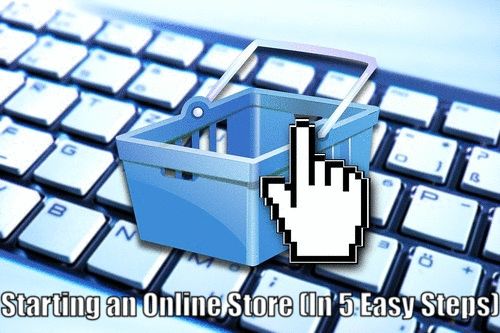How To Start An Online Store (In 5 Easy Steps)

Nearly 100% of Americans have made a purchase online in their lifetimes, and more than half of Americans prefer shopping online to shopping in a store. With statistics like these, it is clear that eCommerce will continue to flourish and grow over time. That is why there has never been a better time to start your own online business.
Whether you have a bricks-and-mortar shop that you would like to bring into the digital age, or simply have an idea for products that you think people will love, you can start a professional and fully featured online store with minimal effort and in a short amount of time.
1. Choose Your Product

If you want to create an online store, odds are you already have a product to sell in mind. If not, however, here are some things you should consider when selecting your store’s merchandise.
- Do you want to sell something digital or physical? Physical items require extra effort to package, ship, and track. They can also get damaged in the mail, making you liable for their replacement.
- Do you want to sell a wide variety of products or will you be a niche market? Having many stock keeping units (SKUs) is manageable on website builders like Wix, Weebly, and Squarespace, but can quickly become a hassle once you begin managing them at home or in a warehouse. On the other hand, having a wide selection broadens your store’s reach and appeal.
- Is the product mass-produced or individually crafted? If it is the latter, you may eventually have trouble keeping up with demand.
These are just some of the considerations you will make when choosing a product. They should not scare you away, however, as some of the best businesses began with a big dream that became a reality.
2. Create a Business Plan
Once you know what you want to sell you have to create a business plan. We recommend starting small to test the waters and then expanding, but a business plan should be applicable no matter how small you start and how big you become.
First, you will need to calculate your production costs. If you are purchasing your inventory, it shouldn’t be too difficult to figure that out, but if you are creating your product you have to factor in all of the costs associated with pushing out a completed product. Set a cost limit for yourself to figure out if your product will be viable based on your retail price point.
Shipping is a major consideration for any online business. Many customers prefer free shipping, but unless you can effectively merge that into your price, you will need to consider a feasible shipping cost and method. Know the weights of all of your products in their shipping boxes so that you can accurately assess your costs.
Taxes are one of two certainties in life, and an online business will incur state-level taxes. You may need to register your new business, depending on your location, and you should always employ proper accounting measures to prevent future inquiries or audits.
Finally, understanding what you want from your website is important before even signing up for a hosting service. What kind of functionality do you expect and how do you want to present your products to your site visitors? These are important questions to answer when creating an online business plan because they will prevent future confusion down the road.
3. Choose an eCommerce Website Builder

There are many options for creating an eCommerce website and with so many candidates vying for your business, you will be able to leverage your higher ground to find a website builder that caters to all of your needs. Modern eCommerce website builders offer a bevy of features on par with even the most high-end and professional sites.
Storefront
Your site’s home page, or storefront, will either inspire confidence in your brand or make a potential customer think twice. That is why a good website builder must offer essential features like professional themes, mobile-friendly interfaces, and powerful blogging tools. All of these should be considered nonstarters if not offered by a service.
Shopping Cart
There is much more to a shopping cart than might be immediately apparent. A modern shopping cart tool should offer high-level security features like SSL certification, an ability to accept all credit cards in addition to other payment gateways, and automatically calculate shipping and taxes.
Aside from these basics, additional features like abandoned checkout recovery, which can automatically send emails to customers who failed to complete their purchase, may be crucial to your business needs.
Store Management
Managing an online store can be a complex task. Thankfully, most eCommerce website builders offer integrated management solutions, like customer profile and account creation, order fulfillment, refunds, email newsletters, and more. Features like these can act as a bricks-and-mortar store manager would and will save you money on employing someone to track these parameters for you.
Products
One of the biggest draws of website builders is they offer digital systems that manage your inventory and organize your products. This allows you to see all of your products at a glance and make any changes necessary, both in the digital realm and with your physical stock.
Top Website Builders reviews some of the best eCommerce builder tools on the market and we encourage you to peruse our site once you are ready to learn more about your many options.
4. Create an Online Store
Once you decide on which website builder you will use to build your store, you can simply create an online store by taking advantage of the intuitive platform and simple user interfaces offered by sites like Wix. While most of the work will be done for you, there are certain things that you can do in order to improve your odds of success and increase your sales.
Product Images
The way you showcase your products is paramount to your business success. Try to use the highest quality camera you can get your hands on and use a white, clutter-free background to highlight the product and only the product. Add some detailed closeups and, if relevant, some contextualized imagery (ie, a picture frame hanging on the wall of a room).
Descriptive Text
Although a picture is worth a thousand words, good descriptive text is also an important way to sell your products. In-store shoppers have an opportunity to feel, hold, and interact with a product; online shoppers do not. It is, therefore, crucial that you recreate that physical experience with a descriptive one. While this skill takes time to fully develop, you can begin right now by assessing the objects around you and challenging your friends to imagine the product and seeing how close the description gets to what they imagined.
Reviews
There is hard evidence that correlates ratings with influencing a purchasing decision. Understanding the pros and cons of an item, along with how other users felt about the overall quality is crucial to increasing sales. Simply put, if your eCommerce website builder offers this feature, use it.
5. Market Your Store

Once your store is up and running you will want to run through the neighborhood and tell everyone. And while we highly recommend you do just that, there are also more practical methods you can use to market your store.
Advertising
The last thing most people want to do is create extra expenses that will eat away from their bottom line by spending additional money on advertising. It is, unfortunately, a fact of life that your online business will need an advertising budget at some point. Advertising is a good way to create an initial word of mouth, hype up your latest products and sales, and keep potential customers informed.
Social Media
Once you have a base of clients, ensure that you interact with them often by using as many social media channels as possible. Sites like Facebook, Instagram, and Twitter can be effective free marketing tools. Posting links to your content and even the content of others is a great way to keep your business in the hearts and minds of users.
SEO
As mentioned above, blogging is an essential part of any store front. Blogs serve as a value-added feature to online stores that act as a way of informing potential customers of your business by providing interesting and informative content. This content, if deemed worthy by search engines, can be featured in the results of a web search and your store will begin garnering organic traffic. You may even find people sharing links to your content on their own sites. Content is king on the internet and if you master it, your store will benefit.
Email Newsletters
Nobody likes being inundated with emails, but, when used sparingly, they can be a good way to keep your base updated about the latest sales, products, and initiatives on your site. Many website builders offer powerful email tools, but there is also a pool of different third-party clients and tools you can use as well.
Running your own business can be an extremely satisfying and lucrative venture. eCommerce website builders and tools have made many tasks that were once daunting easy. Like anything else in life, the only limit to your success is yourself. So what are you waiting for? Get started today!
